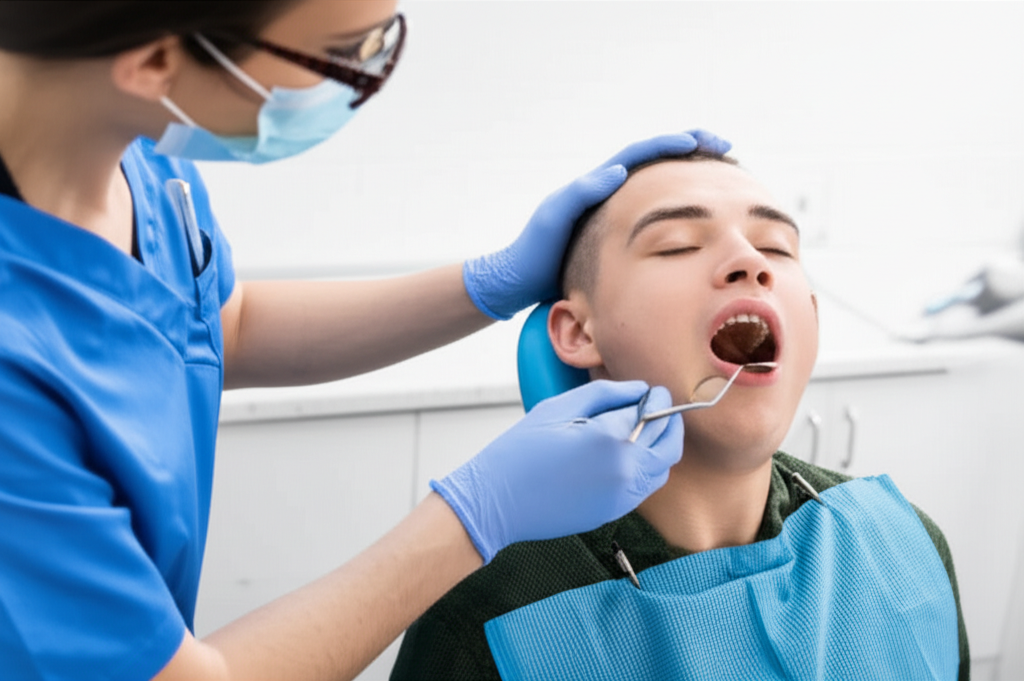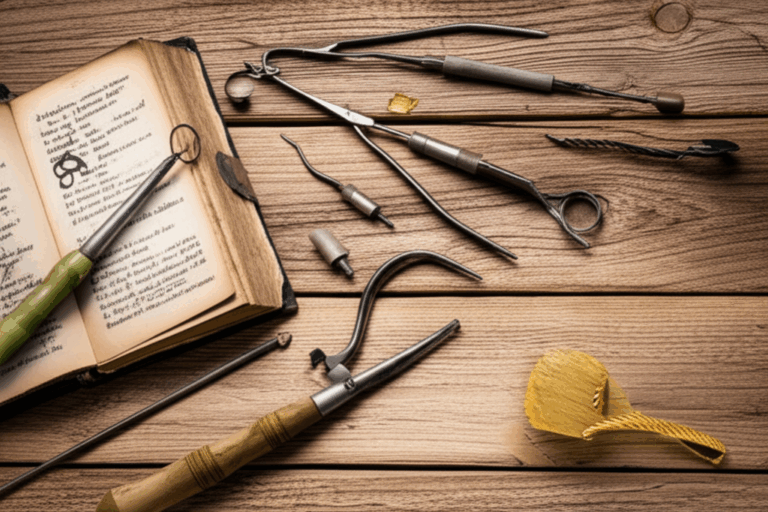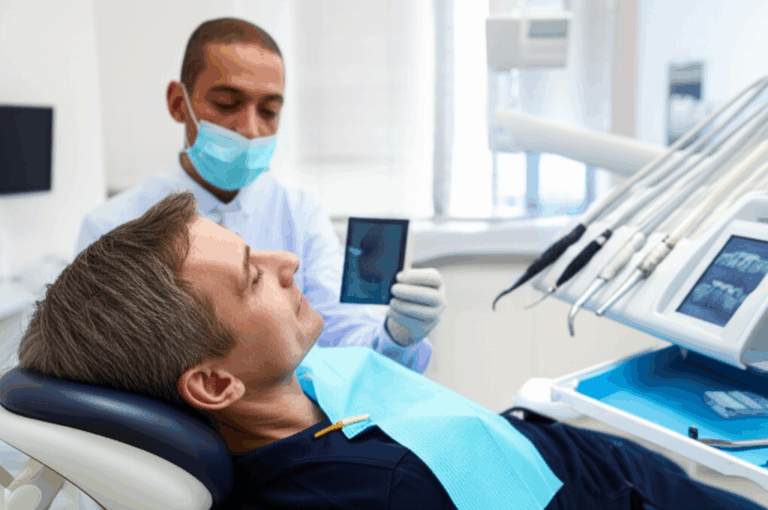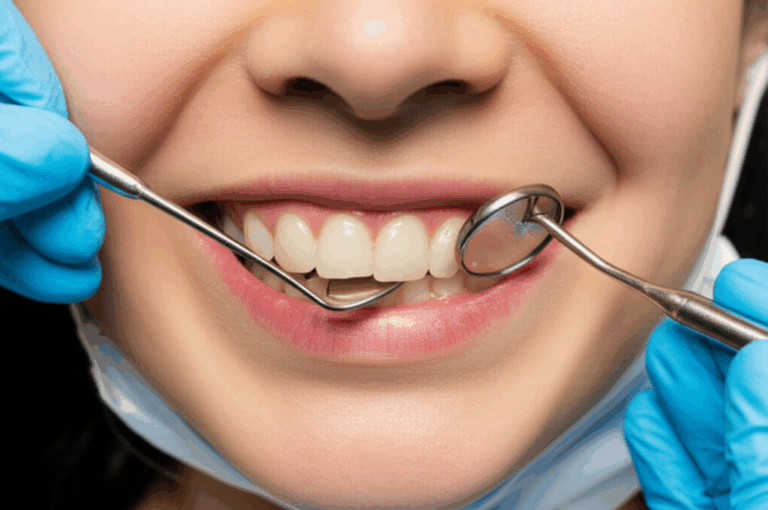
Can Your Dentist Diagnose TMJ? Understanding the Dental Approach to Jaw Pain
Have you ever had jaw pain, heard clicking sounds when you chew, or struggled to open your mouth wide? You might wonder, can your dentist diagnose TMJ? This article will answer that question, showing what TMJ and TMD are, what symptoms you should look out for, how dentists check for this problem, and how they can help. Reading this can help you find the right dentist and the right fix if you’re having jaw pain.
Table of Contents
What Is TMJ and TMD?
TMJ stands for temporomandibular joint. It’s the hinge that connects your lower jaw to your head, right in front of each ear. You use this joint every time you eat, talk, yawn, or sing. The muscles and bones in your face work together to help you make these movements without hurting.
TMJ problems, called TMD, happen when this joint or the muscles around it don’t work like they should. This can mean pain, popping or clicking sounds, and problems moving your jaw. Even easy things—like chewing a sandwich or talking—can start to feel tough and annoying.
This is common: TMD affects about 5–12% of people, and it usually starts between ages 20 and 40. Women are more likely to have TMD than men. Lots of people don’t know they have this problem until it starts to hurt or their jaw suddenly locks up.
Who Can Diagnose TMJ Disorders?
You might ask, “Do I see my dentist or a doctor for jaw pain?” The answer: Start with your dentist. Dentists are trained to look at your mouth, teeth, and the jaw joint. In fact, up to 70% of people with jaw pain or TMJ signs first go to their dentist.
Dentists are good at spotting the early signs of TMD. They also know how to tell the difference between a toothache, gum problem, ear infection, and TMJ trouble. Sometimes, dentists see early TMJ issues during check-ups—even before you feel pain.
But not every TMJ problem is simple. If your symptoms get worse, or if your case is tricky, your dentist might send you to a TMJ specialist like an oral and maxillofacial surgeon, orofacial pain doctor, or even a physical therapist.
What Causes TMJ Disorder?
There are lots of reasons for TMJ pain. Some people grind or clench their teeth at night (bruxism), which makes the jaw muscles tired and sore. Others may have arthritis in the jaw. Sometimes a punch to the face or even a car accident hurts the TMJ or the muscles around it.
TMJ trouble can also show up with:
- Muscle tightness from stress or worry
- Bad bites (malocclusion) where teeth don’t fit together right
- Jaw injuries from sports or accidents
- Habits like chewing gum all the time or biting your nails
Sometimes there isn’t just one thing. Many TMJ problems come from a mix of stress, habits, and small injuries that add up over time.
What Are the Common Symptoms?
I remember when I started grinding my teeth at night because of work stress. At first, nothing happened. Later, I woke up with a sore jaw, found it hard to chew my breakfast, and even had headaches that wouldn’t quit. I was surprised my dentist, not my doctor, found out it was TMD.
You should see your dentist if you have:
- Jaw pain or face pain, especially when chewing or talking
- Stiffness, swelling or muscle cramps in the jaw
- Clicking, popping, or grinding sounds (called crepitus) when moving your jaw
- Trouble opening your mouth wide or the jaw getting stuck (lockjaw)
- Changes in how your teeth fit together
- Pain in the ears, neck, or headaches
- Tooth sensitivity that doesn’t come from cavities
Here’s a quick table with these symptoms:
| Symptom | Description |
|---|---|
| Jaw Pain | Soreness in jaw, face, or mouth |
| Clicking/Popping | Noises when opening/closing mouth |
| Limited Movement | Hard to open or move jaw |
| Locking | Jaw gets stuck (open or closed) |
| Ear Pain, Headaches | Pain may spread to ear or head |
| Bite Changes | Teeth feel different when biting down |
How Does a Dentist Diagnose TMJ?
When you tell your dentist about jaw pain or clicks, they do more than just look at your teeth. Here’s what usually happens at a TMJ visit:
Step 1: Asking Questions
The dentist will ask you about your problems—where it hurts, when it started, what makes it worse (chewing, stress, yawning). They’ll check if you grind your teeth or have habits like chewing ice or gum. They’ll want to know about injuries or arthritis too.
Step 2: Checking Your Jaw
All these steps help your dentist decide what’s wrong—even before using any x-rays or scans.
What Tests Do Dentists Use for TMJ?
Most times, dentists can tell you have TMD by asking questions and checking you. But sometimes, extra tests help see what’s happening in the joint.
- Dental X-rays: These show the jawbone and teeth. They help rule out tooth problems or bone issues but can’t show soft parts.
- MRI (Magnetic Resonance Imaging): This test shows soft things, like the disc inside your TMJ. It helps if the dentist thinks the disc has moved.
- CT Scan (Computed Tomography): This gives better pictures than regular x-rays and shows the bone shape. It’s good if your dentist thinks you have arthritis or other big problems.
Dentists use these tests only if you have tricky symptoms or you’re not getting better with simple treatments.
When Does a Dentist Refer to a TMJ Specialist?
Dentists are good at finding and helping with mild or middle TMJ problems. But what if your pain doesn’t go away, or the cause seems hard to figure out?
Your dentist refers you to a specialist if:
- You have really bad or nonstop pain even after trying basic care and medicine
- The jaw feels stuck or keeps locking
- The dentist thinks you might have arthritis, immune problems, or something rare
- You may need tough treatments, like surgery
- Your case needs a closer look by experts in jaw surgery, pain, or therapy
Here are the specialists your dentist might send you to:
- Oral and Maxillofacial Surgeons: Experts in jaw surgery or hard dental problems
- Orofacial Pain Specialists: Focus on pain in the face, jaw, and head
- Physical Therapists: Can teach you exercises to help move the jaw
- Neurologists: If the pain is nerve-related or hard to explain
- Rheumatologists: If there’s arthritis or immune issues in the jaw
Your dentist will guide you to the right expert if needed, keeping things simple for you.
What Are the Treatment Options After Diagnosis?
After your dentist tells you that you have TMJ problems, what next? Good news—treatment usually starts easy.
- Self-care: Rest your jaw with soft foods and stop chewing gum or tough snacks. Try warm packs for pain relief.
- Medicine: Your dentist may suggest simple painkillers like ibuprofen, or sometimes muscle relaxers if pain is tough.
- Oral Appliances: Nightguards or splints keep the jaw in a relaxed spot and stop nighttime grinding or clenching.
- Exercises and Therapy: Special jaw moves and gentle stretches can help a lot. The dentist or a therapist can show you these.
- Stress Management: If stress is part of the problem, calming exercises and even biofeedback can help relax your jaws.
Studies say that 70–85% of people with TMJ problems feel better with these easy treatments. Very few people need shots or an operation. Check-ups help watch your progress and change things if you need.
For example, as a night guard dental lab, we help dentists by making custom night guards that help with TMJ-linked clenching and grinding. These mouthpieces, when your dentist recommends them, work well and have few side effects.
Why Start With Your Dentist for Jaw Pain?
You might call your doctor, but your dentist is the first one to see for jaw pain, pops, or other TMJ signs. Here’s why:
- Dentists know your mouth and jaw history and spot problems early
- They can rule out tooth problems for your pain (like decay or infection)
- Dentists keep up with the latest TMJ fixes and when to use them
- If your case is tough, they can send you to the best specialist for your needs
Nobody wants to keep going from doctor to doctor. Starting with your dentist saves time and helps you feel better quicker.
Dentists often work with good partners, like china dental lab, to make sure any needed mouth devices—splints, nightguards, or crowns—fit just for you and help your TMJ problems right away.
Can a Dentist Help Prevent TMJ Problems?
Yes! Lots of TMJ problems go unnoticed until they get bad. But, regular dental visits help spot early warning signs. Your dentist checks for:
- Worn-down teeth from nighttime grinding or clenching
- Changes in your bite that could mean jaw stress
- Early clicking or popping when you move your mouth
With good advice—like how to handle stress, use a nightguard, or drop bad habits—you can stop TMJ troubles before they start.
Dentists now use new technology from digital dental lab partners to make mouthpieces and teeth repairs that keep your bite healthy, which helps your jaw open and close without any problems.
Frequently Asked Questions
Q: Can a TMJ disorder go away on its own?
A: Sometimes, light TMJ pain will stop by itself, especially if it’s from stress or using your jaw too much for a short time. But if jaw pain, clicking, or movement sticks around for more than a week, see your dentist. Early treatment is best.
Q: How long does it take for a dentist to diagnose TMJ?
A: Most times, your dentist will know at your first visit—usually in less than an hour—by asking you questions and checking your jaw. Complicated cases that need x-rays or MRIs may take a bit longer.
Q: Is TMJ curable?
A: Most people can control symptoms quite well with easy treatments. TMJ can come back, but pain and jaw movement usually get better with care.
Q: Should I see my doctor or my dentist first?
A: See your dentist first for jaw pain, clicks, or bite changes. They know how to spot TMJ issues and can send you to your doctor if needed.
For more helpful dental info, read our practical guide or visit our patient dental resources.
Key Points to Remember
- TMJ disorder is common and can cause pain, popping, and trouble moving your jaw
- Dentists are the right person to see for TMJ problems
- Dentists use your story, a jaw check, and sometimes x-rays or MRI to find the problem
- Most TMJ problems get better with simple fixes like nightguards, medicine, and exercises
- If home tricks don’t help, dentists send you to a TMJ specialist for stronger care
- Regular dentist visits help find TMJ problems early and stop them from getting worse
Don’t ignore jaw pain or clicking. Your dentist can help you feel better, sometimes right away!








